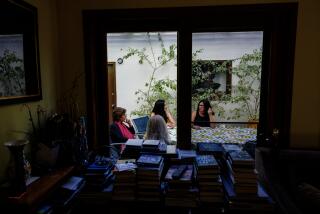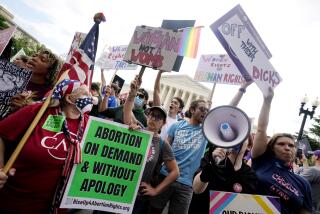Abortion Decision Divides Rival Camps : Supreme Court: Advocates of a woman’s right to choose plan to increase legislative efforts. Others call the ruling a step in the right direction.
Ventura County abortion foes and pro-choice advocates, whose spirited stands sparked demonstrations and arrests a few years ago, disagreed again Monday after the U. S. Supreme Court’s abortion decision.
“They (the government) force their wills on my body, and that’s rape. It’s my body. It doesn’t belong to the government,” Jamie Cox-Nowland, coordinator of the Ventura-Oxnard chapter of the National Organization for Women, said Monday evening.
Cox-Nowland was one of about 100 pro-choice activists who demonstrated Monday evening against the court decision in a parking lot next to the Ventura campaign headquarters of Rep. Elton Gallegly (R-Simi Valley), who opposes abortion in most cases.
“It’s a good step in the right direction--but not enough,” said Ken Craft, a leading antiabortion advocate who is pastor of the Sonrise Christian Fellowship of Simi Valley.
Craft was one of 17 people arrested in 1989 for blocking access to a family planning clinic. About 75 demonstrators blocked access to the Ventura clinic for about five hours.
The comments by Craft and Cox-Nowland reflected the intense feelings nationwide about the high court’s decision. The court, in a 5-4 ruling, blocked states from outlawing abortion but upheld restrictions in a Pennsylvania law that would give states more authority to make it more difficult for women to end pregnancies.
Pro-choice advocates in Ventura County were deeply disappointed in the court decision, which fell one vote short of overturning the landmark 1973 Roe vs. Wade ruling that legalized abortion nationwide. They said a major effort will be mounted on behalf of pro-choice legislation pending in Congress.
Abortion opponents in the county saw the decision as a step toward toppling Roe, allowing states to begin restricting abortions.
“It’s a chip off the block,” said Chris Maguire of Ventura, a spokesman for the Pro-Family Caucus, which opposes abortion. “I’d like to see Roe completely overturned. But we’ll take a little piece here, a little piece there.”
Pro-choice advocates described three restrictions in the Pennsylvania law upheld by the court as setbacks for their cause. Those restrictions are that women seeking abortions must be told about alternatives to ending their pregnancies; that women must wait 24 hours after receiving abortion information before deciding on an abortion; and that unmarried women under age 18 must get consent from a parent, guardian or state judge before getting an abortion.
“The waiting period affects poor women and young women,” said Anita Perez Ferguson of Oxnard, a leading pro-choice advocate and Democrat who is opposing Gallegly in a congressional race that covers most of Ventura County.
In many sparsely populated areas, women have to travel hundreds of miles for abortion help and “would be unable to come back” in 24 hours, she argued.
“Every woman ponders for herself what her moral obligations are,” she said. “Government doesn’t have to tell women what their choice is. A 24-hour waiting period is absolutely ridiculous.”
Gary Schuberg, a spokesman for Life Centers of Ventura County, an antiabortion clinic in Oxnard, said the 24-hour rule should not present a problem.
“Abortion is a very important decision,” he said. Even if a woman has to travel hundreds of miles to return to a clinic, “it’s a small thing to ask,” he said. “It’s good to have time to meditate over it.”
For his part, Gallegly said the Roe decision needs to be changed because “it was excessive, particularly in the area of parental consent. This is an area that has been corrected.”
Gallegly opposes federal funding for abortions except in cases of rape, incest or when the mother’s life is threatened.
As for unmarried women under age 18 needing consent for an abortion, Gallegly said it was a responsible position for the court to take.
“These are young people who need guidance more than at any other time in their lives,” he said.
April Fernandez, director of the Ventura office of the Planned Parenthood Federation of America, characterized the Supreme Court decision as “digressing instead of progressing.”
Under the court’s decision, she said, “the most vulnerable women--the young, the poor, the desperate” and those living in rural areas--would be the most vulnerable to the decision.
She estimated that about 5% of the 2,700 women seeking Planned Parenthood services annually at the Ventura facility come in for an abortion.
“We’re not pro-abortion, we’re pro-choice,” she said. “We don’t like abortion. We’re for a woman to have a choice.”
MAIN STORY: A1
More to Read
Sign up for Essential California
The most important California stories and recommendations in your inbox every morning.
You may occasionally receive promotional content from the Los Angeles Times.










